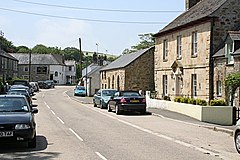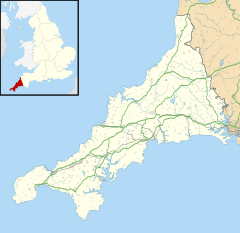This article needs additional citations for verification. (April 2010) |
Mitchell (sometimes known as Michael or St Michael's) is a village in mid Cornwall, England. It is situated 14 miles (22 km) northeast of Redruth and 17 miles (27 km) west-southwest of Bodmin on the A30 trunk road.[1]
| Mitchell | |
|---|---|
 Mitchell village is on the former course of the A30 trunk road | |
Location within Cornwall | |
| OS grid reference | SW861546 |
| Civil parish | |
| Unitary authority | |
| Ceremonial county | |
| Region | |
| Country | England |
| Sovereign state | United Kingdom |
| Post town | NEWQUAY |
| Postcode district | TR8 |
| Dialling code | 01872 |
| Police | Devon and Cornwall |
| Fire | Cornwall |
| Ambulance | South Western |
| UK Parliament | |


Mitchell straddles the old course of the A30 road but a dual carriageway bypass now carries the traffic north of the village. A 16th-century coaching inn called the Plume of Feathers stands in the main street.
History
editThe original name was La Medeshole[2] and the first recorded mention of the village was in a court case in 1234 establishing the legal status of an annual market on St Francis's Day[citation needed]. A chapel of St Francis for the use of wayfarers existed from 1239 until its destruction at the Reformation.[3] The right to hold a fair on the Feast of Saint Francis was granted to the Lord of the Manor by Henry III in 1239 along with a market, and by 1302 both fair and market were being held in Mitchell, and "The Lord's Fair" was still being celebrated in 1499.[4]
From the Middle Ages on, the borough of Mitchell elected two members to the Unreformed House of Commons but was disenfranchised by the Reform Act 1832.[5] Walter Raleigh and Arthur Wellesley, 1st Duke of Wellington were both MPs representing Mitchell.
Due to its central mid-Cornwall location, Mitchell is seen by many as the "go to" location of Cornish cycling. The Mitchell Cycling Club (MCC) was formed in 2016 to capitalise on the local demand and talent.
At Carland Cross, a mile west of Mitchell, there are Iron Age burial mounds and flint arrow heads have been found in local fields.
The Folk Cottage
editMitchell's fame spread during the British folk music revival in the mid-1960s when a folk club opened in the village. Named 'The Folk Cottage'[6] (because it was housed in a semi-derelict farm cottage) it staged both evening concerts and thrice-weekly 'after midnight' sessions.[7] The Folk Cottage became known throughout the UK and played a key part in the burgeoning 1960s folk music and beatnik scene in Cornwall.
The Folk Cottage provided a springboard for many performers who would later become nationally known including Wizz Jones, Jacqui McShee, Clive Palmer (co-founder of The Incredible String Band), and Ralph McTell.[8][9]
See also
editReferences
edit- ^ Ordnance Survey: Landranger map sheet 200 Newquay & Bodmin ISBN 978-0-319-22938-5
- ^ Cornish Church Guide (1925) Truro: Blackford; p. 91
- ^ Cornish Church Guide (1925) Truro: Blackford; p. 91
- ^ "CORNWALL". GAZETTEER OF MARKETS AND FAIRS IN ENGLAND AND WALES TO 1516. Centre for Metropolitan History. 17 November 2006. Retrieved 5 December 2021.
- ^ *Leigh Rayment's Historical List of MPs – Constituencies beginning with "M" (part 3)
- ^ "Folk Cottage". Archived from the original on 26 August 2011. Retrieved 8 May 2011. The Folk Cottage on Kernow Beat
- ^ [1] Wizz Jones website; Folk Cottage; retrieved April 2010
- ^ Chris Hockenhull; Streets of London - The Official Biography of Ralph McTell; pages 38-39. Northdown Publishing Ltd, 1997. ISBN 1-900711-02-8.
- ^ "::: Exclusive Feature :::". Archived from the original on 19 April 2010. Retrieved 19 April 2010. Ralph McTell official website; Retrieved April 2010
